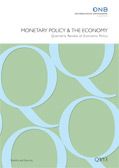Monetary Policy and the Economy Q3/17
 OeNB
OeNB
- published:
- October 2017
 OeNB
OeNB
Monetary Policy and the Economy Q3-17 (PDF, 1.1 MB) October 2017
Call for applications: Visiting Research Program (PDF, 53 kB) de
Austria’s economy will grow by 2¾% in 2017 (PDF, 439 kB) Fenz, Fritzer, Schneider. In the first half of 2017, Austria’s economy gathered further momentum. With growth rates by 0.8% in both the first and the second quarters, Austria recorded its strongest economic growth in six years. The broad-based cyclical upswing is being underpinned by both domestic and foreign demand and will continue in the second half of the year. Based on its quarterly forecasting exercise, the Oesterreichische Nationalbank (OeNB) expects real GDP to expand (quarter on quarter) by 0.7% in the third quarter and by 0.6% in the fourth quarter of 2017. For the year as a whole, economic growth in Austria will thus come to 2¾%. Compared with the OeNB’s June 2017 outlook for GDP growth, this implies an upward revision of 0.5%. Distinctly higher growth rates were last recorded in the boom period of 2006 and 2007, when economic growth accelerated to 3½%. en Oct 23, 2017, 12:00:00 AM
Zur Verteilung der Sparquoten in Österreich
(PDF, 680 kB)
Fessler, Schürz.
In der vorliegenden Studie wird das Sparverhalten der privaten Haushalte in Österreich untersucht. In der wirtschaftspolitischen Diskussion wird das Sparen der privaten Haushalte meist anhand des Begriffs der Sparquote des privaten Haushaltssektors besprochen, einem Konzept aus der Volkswirtschaftlichen Gesamtrechnung (VGR). Wir ergänzen diese Betrachtung um eine mikrobasierte Perspektive und liefern empirische Evidenz auf Basis des Household Finance and Consumption Survey (HFCS). Das ermöglicht uns, die Verteilung der Sparquote auf Mikroebene zu betrachten und auf diesem Wege wichtige Informationen zu wirtschaftspolitischen Fragen des Sparens und des Konsums zu erhalten.
Fast ein Viertel der privaten Haushalte in Österreich spart nicht. Die Sparquoten jener Haushalte, die sparen, liegen zwischen 2 % und über 50 % der jeweiligen Haushaltsnettoeinkommen. Die Sparquote steigt mit dem Einkommen stark an. Altersspezifische Zusammenhänge sind kaum zu beobachten, sobald für das Einkommen kontrolliert wird.
In vielen Modellschätzungen und Simulationen mussten aufgrund unzureichender empirischer Schätzungen bislang unterschiedliche Sparquoten bzw. Konsumneigungen für die österreichische Haushaltspopulation angenommen werden. Unsere Studie liefert erstmals Schätzer für Sparquoten über die gesamte Einkommensverteilung in Österreich und informiert über den Zusammenhang zwischen Sparquote und sozioökonomischen Charakteristika der Haushalte.
en
Oct 23, 2017, 12:00:00 AM
The financial system of the future (PDF, 147 kB) Beer, Gnan, Mayer, Summer. Modern economies need a functioning financial system. In principle, the financial system has four main functions: providing a payment system, matching borrowers and lenders, enabling people to manage their personal finances across their lifetimes and between generations, and sharing and managing risk. Despite the implementation of a series of reforms in 2010, including enhanced capital requirements for banks, new banking resolution legislation and the centralization of derivatives markets, the question whether the current financial system is fit for the future remains unanswered. Critics claim that the financial system today is still very similar to what it was before the financial crisis started in 2007. So is the financial system fit for the future? Will its current structure allow it to fulfill its main functions? Do we need further structural changes? If so, what kind of changes? Are tighter banking regulation, an increasing role for shadow banking and the EU’s project of establishing a capital markets union the way to go? What opportunities and potential risks do such changes involve? How will technological developments like FinTech and digital money shape the future financial system? To shed light on these issues, the Oesterreichische Nationalbank (OeNB) joined forces with SUERF – The European Money and Finance Forum to organize its 44th Annual Economics Conference in Vienna on May 29 and 30, 2017, on the topic The Financial System of the Future. en Oct 23, 2017, 12:00:00 AM